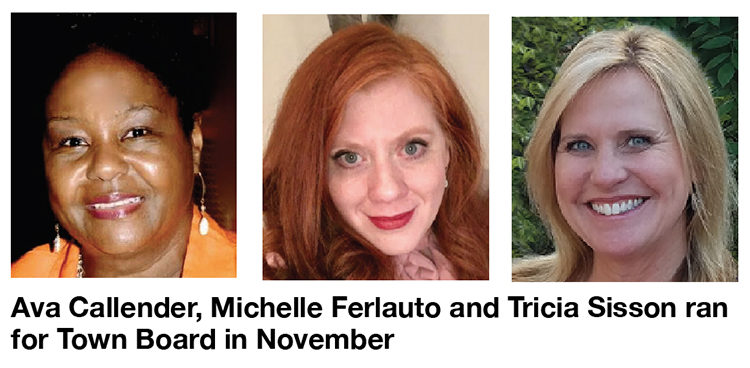
By Dave Yochum. The three women who ran for Cornelius Town Board—and lost last fall—remain active in local issues, one sign they might be back again.
Ava Callender remains active in community issues like affordable housing, community playgrounds and Alzheimer’s awareness; Michelle Ferlauto has been appointed to a county-wide board on women’s issues; and Tricia Sisson will chair the Lake Norman Chamber next year.
“You can’t turn it off, it’s not about winning or losing,” Ferlauto said of public service.
All around us, women are active in local politics: Two serve on the board of commissioners in Mooresville, two in Davidson and one in Huntersville. In Charlotte, Vi Lyles is the mayor, having succeeded Jennifer Roberts, another woman.
There hasn’t been a female commissioner in Cornelius since January of 2013 when Lynette Rinker was elevated to mayor. She served briefly as mayor before being defeated in her bid for the NC House of Representatives.
Women are making inroads in politics all around the country. In 1977, only 4 percent of Congress and 9 percent of state legislators nationwide were female. Twenty years later, 11 percent of Congress was female and 21.6 percent of state legislators were female.
Last year there was an even bigger jump nationwide: Nearly 20 percent of Congress was female, and 25 percent of state legislators were female.
Ferlauto, who has been appointed to the Mecklenburg County Women’s Advisory Board, argued for open meetings of the I-77 Advisory Group despite a vaguely threatening phone call.
“I haven’t ruled out running again. It’s not something I would commit to right now, I will look at my scars and decide,” she said.
Diversity around gender, color, background and sexuality help inform decisions, Ferlauto, a small businesswoman, said. “If the only people you surround yourself with are the same people, you’re not really representing all the people in the town.”
Obviously we’ve had some real stinkers in the world of decision-making, ranging from the sail and mast treatment of the Exit 28 bridge superstructure to tolls on I-77—but both decisions were made while women were represented in town government.
But the more collaborative nature of women, their risk-aversion and the reluctance to showboat can make for better decisions. “Women tend to become risk-alert under stress and go for the smaller wins that are more guaranteed,” said Dr. Therese Huston, founding director of the Center for Faculty Development at Seattle University.
Then, too, running for elected office is not for shrinking violets.
No less than Jim Duke, a two-term town commissioner, said Callender, Ferlauto and Sisson are “bright and thoughtful young women [who] brought civility to a process that was nasty from the start.”
Saying that the three women will all someday serve on elected boards, Duke said they have “the talent, wisdom and insights that are so much needed in our civil society.”




